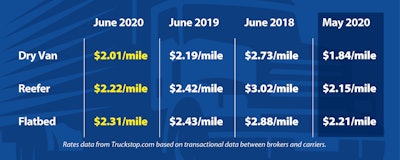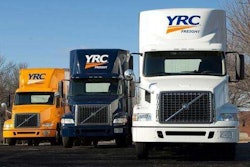Though the surge in coronavirus cases entering July threatens to stall the recent recovery momentum of the U.S. economy, data so far from June relative to trucking show strength.
Total employment in the for-hire trucking industry rose by 8,100 jobs in the month, according to the Department of Labor’s preliminary Employment Situation Report for June. That builds on May’s gains of 2,000, which followed a massive loss in April — 92,000 jobs on a seasonally adjusted basis, according to the DOL.
The U.S. economy as a whole in June added 4.8 million jobs, according to the DOL’s preliminary report, and the unemployment rate fell to 11.1% — down from May’s 14.3%.
Trucking industry employment totaled 1,440,700 in June — its lowest point since late 2014, the prior two months aside.
Major freight producing sectors construction and manufacturing both saw big gains in the month — 158,000 and 356,000 jobs added, respectively. Both are still well shy of their March figures, however, having gained back just about half of the jobs lost in April over the past two months.
The transportation and warehousing sector as a whole added 98,700 jobs in the month. The bulk of those are in the warehousing and storage sector (60,500), and couriers and messengers made up for another 21,100 jobs. Air transportation and rail transportation both reported job declines — 3,600 jobs and 2,500 jobs, respectively.
Meanwhile, spot market rates surged in June, according to Truckstop.com data.

Per-mile spot market rates jumped in all three major truckload segments in June, rallying from the March-to-April spot market crash, in which rates plummeted as shelter orders related to the COVID-19 pandemic took hold and as restocking from the March panic buying subsided.
Dry van rates saw the biggest gains, climbing 17 cents per mile on average to $2.01, according to Truckstop.com’s transactional data. That’s shy of the segment’s recent high in March ($2.07), but better than February’s $2 per mile. June’s per-mile van average was down 18 cents from the same month last year.
Reefer rates jumped 7 cents a mile in June from May, to $2.22. That’s down from January’s $2.36 a mile and March’s $2.30, but up from April’s $2.12 average. However, reefer’s average in June was down 20 cents from June 2019.
Lastly, flatbed rates rose 10 cents in June from May to $2.31 a mile. Flatbed’s average was still down from its recent high in March, $2.43 a mile. Likewise, the segment was down 12 cents from last June’s $2.43 average.










